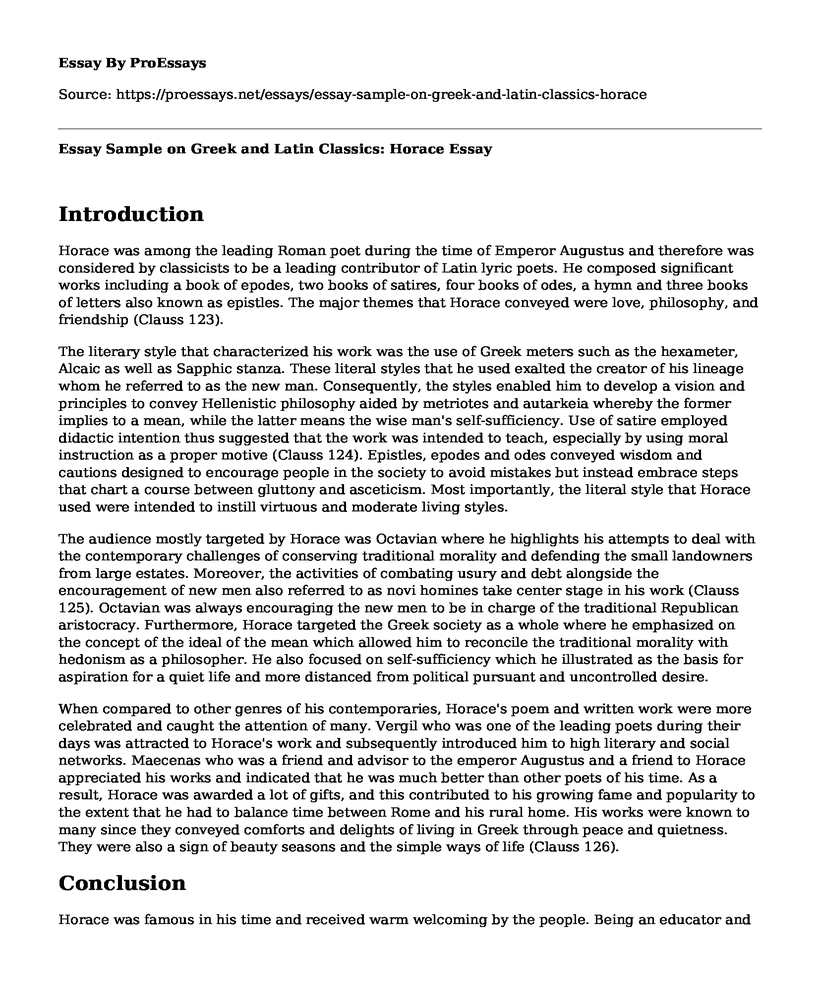Introduction
Horace was among the leading Roman poet during the time of Emperor Augustus and therefore was considered by classicists to be a leading contributor of Latin lyric poets. He composed significant works including a book of epodes, two books of satires, four books of odes, a hymn and three books of letters also known as epistles. The major themes that Horace conveyed were love, philosophy, and friendship (Clauss 123).
The literary style that characterized his work was the use of Greek meters such as the hexameter, Alcaic as well as Sapphic stanza. These literal styles that he used exalted the creator of his lineage whom he referred to as the new man. Consequently, the styles enabled him to develop a vision and principles to convey Hellenistic philosophy aided by metriotes and autarkeia whereby the former implies to a mean, while the latter means the wise man's self-sufficiency. Use of satire employed didactic intention thus suggested that the work was intended to teach, especially by using moral instruction as a proper motive (Clauss 124). Epistles, epodes and odes conveyed wisdom and cautions designed to encourage people in the society to avoid mistakes but instead embrace steps that chart a course between gluttony and asceticism. Most importantly, the literal style that Horace used were intended to instill virtuous and moderate living styles.
The audience mostly targeted by Horace was Octavian where he highlights his attempts to deal with the contemporary challenges of conserving traditional morality and defending the small landowners from large estates. Moreover, the activities of combating usury and debt alongside the encouragement of new men also referred to as novi homines take center stage in his work (Clauss 125). Octavian was always encouraging the new men to be in charge of the traditional Republican aristocracy. Furthermore, Horace targeted the Greek society as a whole where he emphasized on the concept of the ideal of the mean which allowed him to reconcile the traditional morality with hedonism as a philosopher. He also focused on self-sufficiency which he illustrated as the basis for aspiration for a quiet life and more distanced from political pursuant and uncontrolled desire.
When compared to other genres of his contemporaries, Horace's poem and written work were more celebrated and caught the attention of many. Vergil who was one of the leading poets during their days was attracted to Horace's work and subsequently introduced him to high literary and social networks. Maecenas who was a friend and advisor to the emperor Augustus and a friend to Horace appreciated his works and indicated that he was much better than other poets of his time. As a result, Horace was awarded a lot of gifts, and this contributed to his growing fame and popularity to the extent that he had to balance time between Rome and his rural home. His works were known to many since they conveyed comforts and delights of living in Greek through peace and quietness. They were also a sign of beauty seasons and the simple ways of life (Clauss 126).
Conclusion
Horace was famous in his time and received warm welcoming by the people. Being an educator and the first American advocate of public education, he advocated for a democratic society. He also believed in a free and universal education facilitated by reliant and well-trained professional teachers. He participated in politics as an adviser to the government and his support for democracy was a move that was a sign for liberation to many. Education became the tool that he encouraged the society to embrace for a better future.
Work Cited
Feeney, Denis. Beyond Greek: The Beginnings of Latin Literature. Harvard University Press, 2016.
Cite this page
Essay Sample on Greek and Latin Classics: Horace. (2022, Dec 22). Retrieved from https://proessays.net/essays/essay-sample-on-greek-and-latin-classics-horace
If you are the original author of this essay and no longer wish to have it published on the ProEssays website, please click below to request its removal:
- Literary Essay Example: Theme of Death in The Raven and Frankenstein
- LeRoi Jones Conversion to Islam
- Creativity and Rationality in Charlotte Gilman's The Yellow Wallpaper
- How It Feels to Be Colored Me by Zora Hurston Analysis Paper Example
- Shirley Jackson's The Lottery Essay Example
- Literary Analysis Essay on The Fifth Season
- Sir Thomas Wyatt's Love Poems: Heartache & Loyalty - Essay Sample







